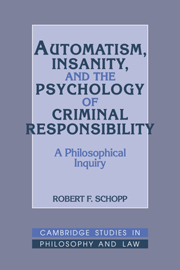4 - Actions, reasoning, and offenses
Published online by Cambridge University Press: 07 October 2009
Summary
This chapter will propose an analysis of the MPC offense elements that is intended to clarify the nature and purpose of the objective offense elements and of the voluntary act and culpability requirements. This analysis employs philosophical action theory as a conceptual framework with which to explicate both the nature of these offense elements and the relationships among them. Section 4.1 will summarize the relevant parts of Alvin Goldman's causal theory of human action, and Section 4.2 will analyze the MPC offense elements in light of this theory of action. Section 4.3 will respond to certain criticisms that have previously been leveled against causal theories of action, and will demonstrate that the MPC offense elements can be understood as intended to insure that criminal guilt is attached only to acts that are suitably attributable to the actor in his capacity as a practical reasoner. Finally, Section 4.4 will summarize the analysis of the entire chapter.
ACTION THEORY
Alvin Goldman has advanced a theory of human action that individuates actions as a particular person's exemplifying an act-type at a particular time. Act-types are defined in terms of certain properties that can be exemplified by an actor at a specified time. Examples of act-types include moving one's finger, writing a letter, making a speech, or firing a gun. In contrast, green is a property of grass or dollar bills, but it is not an act-type because it is not a property that a person can exemplify.
- Type
- Chapter
- Information
- Automatism, Insanity, and the Psychology of Criminal ResponsibilityA Philosophical Inquiry, pp. 86 - 131Publisher: Cambridge University PressPrint publication year: 1991

